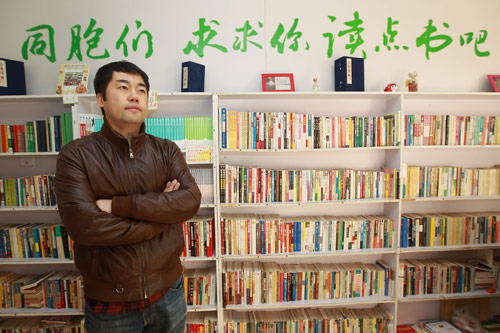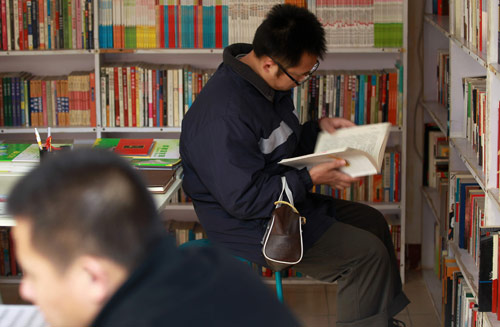Books with legs
Updated: 2012-11-14 11:08
By Zhou Wa (China Daily)
|
|||||||||||
 |
|
Xu Dawei started the Civilian Mobile Library in Beijing in the hope that more people would get into the habit of reading. Photos by Cui Meng / China Daily |
An avid reader says there is no sense in letting volumes gather dust on shelves, Zhou Wa reports.
Liu Zhangxu could not believe his ears when he was told he could bring the book home from the library without paying any money.
"You only need to pass the book to another person when you finish reading it," says Xu Dawei, 35, curator of the Civilian Mobile Library in Beijing, after he noticed the confusion on Liu's face.
Xu has been repeated explaining this since he founded a mobile library in China, which offers books to visitors for free if they promise to pass them on.
"I started the mobile library because books changed my life and I hope others can also improve their lives through reading," Xu says.
Xu comes from a rural village near the city of Yantai, Shandong province. After he graduated from college, he could not find a job with his degree in accounting.
Finally, he turned to what he loved doing - marketing.
"I'm always confident and I think I can make a difference in a marketing plan," he says.
After he finished reading more than 200 books related to marketing and advertising, Xu secured his first job at the advertising department of a provincial television station in 2000.
Seven years later, Xu established his own marketing and planning agency and became successful.
"Reading has helped me a lot. It will also help others. It doesn't cost too much and it is easily accessible to everybody," Xu says.
But few people have the habit of reading books nowadays in China.
In this "era of information", some people just surf for data on the Internet, without thinking too much, while others read just to kill time.
In fact, the Chinese just do not read that many books at all.
According to a report on People's Daily in 2010, the average Chinese read four-and-a-half books per year on average, while Israelis read 64, Japanese read 40, the French read 20 and South Koreans read 11 books each year.
To help more people develop the habit of reading, Xu is putting each of his books into as many hands as possible.
"A book is meaningful only when it is read," he says. "How do you cultivate an atmosphere of reading if books are all left on shelves?"
As a bookworm, he hopes other book lovers can spread the habit of reading by passing on the books.
He rented a two-room bungalow for the mobile library in 2010. The bigger room of about 10 square meters is used for reading and the smaller one is for storing unclassified books.
The house is located in downtown Beijing along a quiet, 1.5-meter-wide hutong next to the Imperial Academy, the highest education institution in ancient China from the Yuan Dynasty (1271-1368) to the Qing Dynasty (1644-1911).
"At the beginning, I bought all the books", Xu says. To run such a library was costing him about 500,000 yuan ($80,250) per year, nearly one-third of his income.
His family was not entirely pleased.
Ai Jie, Xu's wife, says she and other family members had doubted if it was a good idea to put so much money into such a costly effort. After all, the family could have bought a bigger house or made several trips overseas with that amount of money.
But Xu insists on keeping the library going, especially now when he is starting to get support from others.
Two neighbors, Liu Zhangxu and his wife, often help Xu manage the library as volunteers. And Xu says he sometimes finds bags of good quality books lying at the gate of the library. Such support strengthens Xu's determination.
Curious neighbors from around the library became Xu's first readers.
"At first, I was wondering whether he would charge me for reading books, but when he really gave me free books and we got more familiar with each other, I knew he is doing something great," says Liu.
"Xu's library has become one of the favorite places that my child likes to visit after school."
Li Yuying, 60, another visitor to the library, says she had thought the library was just a platform to which people could donate their old books.
But Xu doesn't want his library to become a recycling bin. Eighty percent of his books are new, including the latest bestsellers.
Xiao Gang, one of Xu's colleagues at his agency who helps manage the library occasionally when Li Xia, the only librarian is off, says he has cultivated a love for reading after helping in the library.
"When you are around books and people who love books, you get influenced," he says.
"At first, I read kung fu stories for fun, but gradually, I began to read more serious subjects related to my life to enlighten myself."
However, some critics have said Xu built the library only because he wants to become more famous.

Xu shrugs off such comments, adding that some of his clients are more willing to cooperate with him after hearing of the mobile library.
In Xiao's opinion, the library can bring multiple benefits to readers, Xu himself and his company. It is a benign circle.
Xu can invest more in the library if his business is boosted by the fame his library brings.
"At the least, he can rent a bigger house or buy more books with the money," Xiao says.
Xu hopes to make the library more mobile in the future, by renting a mini-bus to ferry free books to 100 cities around China. That will cost about 1.5 million yuan.
"My dream is to spread the habit of reading all over China and if possible, beyond China," Xu says.
Contact the writer at zhouwa@chinadaily.com.cn.
 |
|
Visitors read at Xu Dawei's Civilian Mobile Library. |
Related Stories
Rise in reading 2012-08-28 10:08
Reading without seeing 2012-05-22 09:40
A few words on reading between the digital lines 2012-03-14 10:43
Read your leader 2012-02-28 10:34
China's reading list reveals a few surprises 2011-12-30 10:31
Beijing's kids in Wonderland 2011-10-21 10:19
Today's Top News
Rescuers race against time for quake victims
Telecom workers restore links
Coal mine blast kills 18 in Jilin
Intl scholarship puts China on the map
More bird flu patients discharged
Gold loses sheen, but still a safe bet
US 'turns blind eye to human rights'
Telecom workers restore links
Hot Topics
Lunar probe , China growth forecasts, Emission rules get tougher, China seen through 'colored lens', International board,
Editor's Picks

|

|

|

|

|

|





